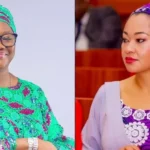President Muhammadu Buhari has revealed why Nigeria’s debt profile is rising since he assumed office in 2015.

President Muhammadu Buhari said Nigeria’s debt profile is rising because his administration had to spend its way out of two recessions.
Buhari stated this on Thursday while presenting the 2022 Appropriation Bill to a joint session of lawmakers at the National Assembly in Abuja.
He said that Nigerians have a right to be concerned about recent borrowings by the Federal Government.
The president, however, stated that the debt level of the present administration was within sustainable limits.
He said, “Some have expressed concern over our resort to borrowing to finance our fiscal gaps. They are right to be concerned.
“However, we believe that the debt level of the Federal Government is still within sustainable limits. Borrowings are targeted at specific strategic projects and can be verified publicly.”
Why Nigeria’s Debt Is Rising – President Buhari
Buhari explained that part of what necessitated the borrowings was the economic recession that hit the country.
“He said, “As recessions within the period of this admin you are aware, we have witnessed two economicistration.
“In both cases, we had to spend our way out of recession, which necessitated a resort to growing the public debt,” he informed the lawmakers.
“It is unlikely that our recovery from each of the two recessions would have grown as fast without the sustained government expenditure funded by debt.”
President Buhari said Nigeria does not have a debt sustainability problem but that of generating revenue.
“Our target over the medium term is to grow our Revenue-to-GDP ratio from about 8 percent currently to 15 percent by 2025. At that level of revenues, the Debt-Service-to-Revenue ratio will cease to be worrying,” the president said.
“Put simply, we do not have a debt sustainability problem, but a revenue challenge which we are determined to tackle to ensure our debts remain sustainable.
“Very importantly, we have endeavoured to use the loans to finance critical development projects and programmes aimed at improving our economic environment and ensuring effective delivery of public services to our people.”
KanyiDaily recalls that the Minister of Finance, Budget and National Planning, Zainab Ahmed, had disclosed that Nigeria’s public debt stock is projected to rise to N38.68 trillion by December 31, 2021.





![Sophia Egbueje Takes Delivery Of Her Lamborghini, Throws Shade At Burna Boy [Video] 7 Sophia Egbueje Takes Delivery Of Her Lamborghini, Throws Shade At Burna Boy [Video]](https://media.kanyidaily.com/2025/03/01175716/Sophia-Egbueje-Burna-Boy-150x150.jpg)




![Chacha Eke Reveals Cause Of Her Mother’s Death [Video] 17 Chacha Eke Reveals Cause Of Her Mother’s Death [Video]](https://media.kanyidaily.com/2025/03/01142114/Chacha-Eke-150x150.webp)




